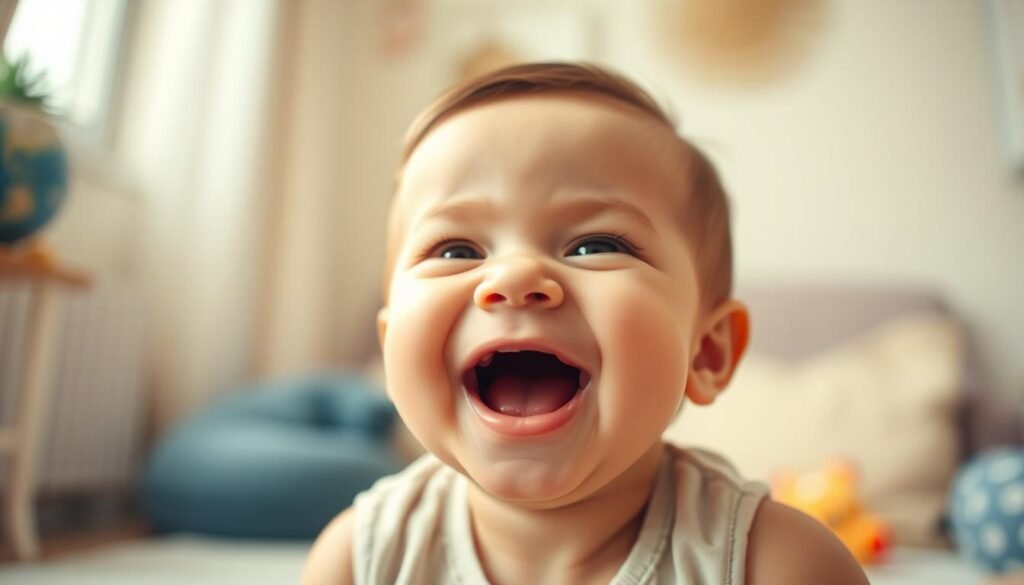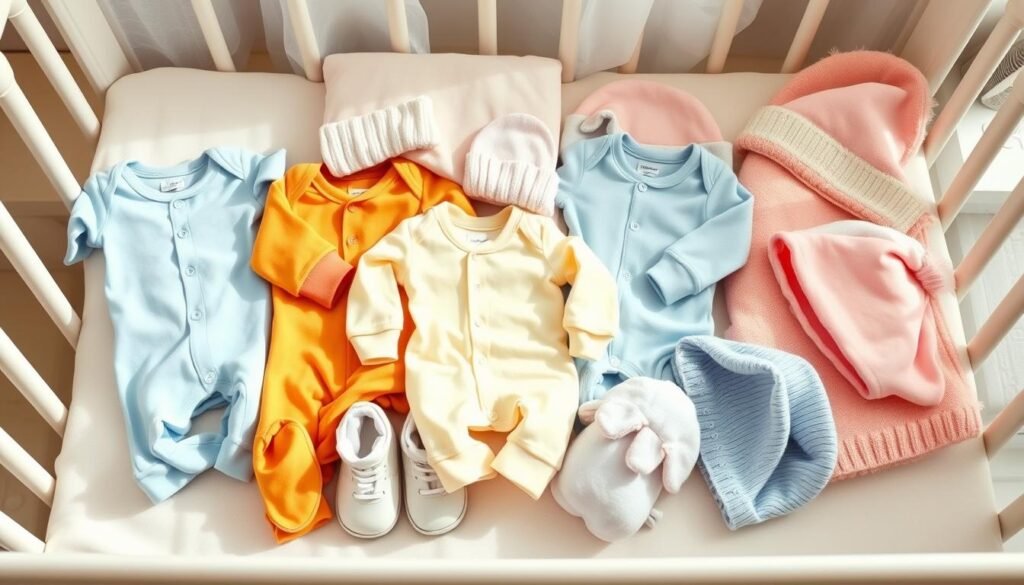I’m excited to explore when babies first laugh, a key milestone in their growth. As a parent, it’s important to know that every baby is different. Some may laugh sooner, while others may laugh later.
The American Academy of Pediatrics says babies usually start laughing around 4 months old. This is a big moment for parents, and I’m eager to learn more about it.
Knowing when babies start laughing and what makes them laugh is crucial. It helps me support my baby’s development and enjoy those special moments. Understanding this is key to appreciating the first time a baby laughs.
When Do Babies Laugh for the First Time: A Complete Timeline
Watching your baby’s baby giggling development is exciting. It’s great to see them go from smiles and coos to full laughter. This journey is a big step in their growth.
The first smiles come around 2 months. Then, giggles start at about 4 months. Here are some important laughter milestones for babies:
- Babies smile for the first time at about 2 months.
- They usually laugh for the first time at 4 months (16 weeks).
- Cooing starts between 6 to 8 weeks, beginning the infant chuckling timeline.
Knowing about baby giggling development and newborns laughing progress helps parents. It lets them know what to expect and support their baby’s growth.
Remember, every baby is unique. Some may laugh sooner or later than others. But, by following the infant chuckling timeline and supporting their newborns laughing progress, parents can help their baby enjoy laughter.
| Age | Milestone |
|---|---|
| 2 months | First social smiles |
| 4 months | First giggles |
| 6 months | Full-blown laughter development |
Understanding the Science Behind Baby Laughter
As a parent, knowing the science of baby laughter is key. It’s a mix of cognitive, social, and emotional growth. This stage is when babies start to show joy and connect with their caregivers. Research shows that laughter in babies is linked to the brain’s reward system, which handles pleasure and happiness.
By 3 months, babies start laughing and smiling when they interact with others. This early way of talking helps them bond and feel emotions. Studies have found that babies who laugh and smile a lot have stronger social bonds and better emotional skills.
Several things affect baby laughter, including:
- Brain development: The brain’s reward system is key for laughter.
- Social interaction: Talking and playing with others helps babies laugh and feel emotions.
- Emotional development: Being able to feel and show emotions is important for laughter.
Knowing the science of baby laughter helps parents see its value. It shows how important social, emotional, and brain growth are. Parents can help their babies laugh and grow by creating a supportive environment.
| Age | Laughter Development |
|---|---|
| 3 months | Babies typically laugh for the first time |
| 6 months | Babies develop social smiles and laugh in response to social interactions |
| 12 months | Babies develop more complex laughter and emotional connections |
Signs Your Baby Is Getting Ready to Laugh
Babies show signs they’re ready to laugh around 3 to 4 months old. The first laugh is a big milestone. Knowing when your baby might laugh helps parents prepare.
Look for smiling, cooing, and eye contact. They might also play back facial expressions. Games like peek-a-boo and silly sounds can make them giggle.
Physical Indicators
By 4 to 6 months, babies laugh during games like peek-a-boo. They might chuckle at 4 months and laugh more by 6 months. If they don’t laugh by 4 months, it’s okay to keep an eye on their development.
Social Cues to Watch For
About 90% of babies laugh and smile by 4 months in social situations. They start to enjoy laughter and connecting with others around this time. It’s a way for them to have fun and bond with others.
Common Triggers for First Laughs
Tickling is a great way to make babies laugh, especially around 6 months. Playing games like peek-a-boo teaches them about humor. Knowing these signs helps parents support their baby’s first laugh and development.
The Role of Parent-Baby Interaction in Developing Laughter
As a parent, I’ve often wondered when do babies laugh for the first time. What triggers this adorable baby laughter milestone? Research shows that parent-baby interaction is key in developing laughter in infants. Playing games like peek-a-boo, tickling, and making silly faces can encourage a baby’s sense of humor.
Studies reveal that babies start laughing around 4 to 5 months old. Their first smile often comes by the end of the second month. As they grow, they start to enjoy funny things, showing surprise and delight.
Some key findings on when do babies laugh for the first time and baby laughter milestone include:
- Babies are expected to produce their first chuckles or giggles around 3 to 4 months of age.
- Full-out belly laughs may emerge between 5 to 6 months of age.
- Parental clowning is the best strategy for eliciting laughter from infants by 6 months.
As a parent, it’s crucial to be responsive to your baby’s cues. Create a nurturing environment that supports their social and emotional growth. This way, you can help your baby reach the baby laughter milestone and foster a lifelong love of laughter and play.
Activities That Encourage Your Baby’s First Laugh
Seeing your baby laugh for the first time is exciting. It’s a big step in their development. To help, try different activities that make them laugh and bond with you.
Try peek-a-boo games, silly sounds, and physical play activities like tickling. These can help your baby develop their sense of humor. They also strengthen the bond between you and your baby.
Peek-a-boo Games
Peek-a-boo games are fun for your baby’s laughter. Start by covering your face and then surprise them with a big smile. This game helps your baby understand that things still exist even when they can’t see them.
Silly Sounds and Faces
Making silly sounds and faces can make your baby laugh. Try different sounds like “boo” or “beep” to see how they react. You can also make funny faces to see if they laugh or smile.
Every baby is unique, so what works for one might not work for another. But with patience and consistency, you can encourage their first laugh. These activities support your baby’s development and help you bond with them for life.
Why Some Babies Laugh Later Than Others
As a parent, you might wonder when your baby will laugh for the first time. Most babies start laughing between 4-6 months. But, some may laugh later. This can happen for many reasons, like how fast they develop, their personality, and their surroundings.
Every baby grows at their own speed. Newborns laughing progress is shaped by their developmental stage. Some laugh sooner, while others take longer. Babies born early or with low birth weight might reach milestones like laughing later.
By 4 months, babies usually start giggling. But, full laughter comes around 6 months. By 9 months, they laugh during games like peekaboo. If your baby isn’t laughing by 6 months, see a doctor to check their hearing.
Laughter is a way for babies to communicate and bond with their caregivers. So, even if your baby laughs later, it’s okay. What matters is they’re growing and interacting with others.
Here are some milestones to watch for in your baby’s newborns laughing progress:
- Responding to facial expressions
- Following objects with their eyes
- Vocalizing vowel sounds, often with consonants
- Babbling strings of sounds
Every baby is different, and it’s okay if they laugh later than others. Just enjoy the journey and celebrate those special moments when they do laugh.
The Connection Between Laughter and Social Development
When do babies laugh for the first time? It’s key to see laughter’s role in social growth. Laughter is vital in forming emotional bonds between babies and their caregivers. It’s an early way for babies to show joy and connect with their world.
Studies show laughter is tied to social growth. It helps babies deal with social situations and find humor. Through laughter, babies learn to connect with others and grow social skills. This helps them form strong bonds and feel part of a community.
Key points about laughter and social growth include:
* Laughter helps form emotional bonds through play.
* It aids in developing communication skills.
* It helps babies navigate social situations and find humor.
* It builds strong relationships and a sense of belonging.
Understanding laughter’s role in social growth shows its importance. Encouraging and responding to baby laughter supports their emotional and social growth early on.
When to Discuss Your Baby’s Laughter with Your Pediatrician
As a parent, you might wonder when your baby will laugh for the first time. Babies usually start laughing around 4 months old. This laughter can start as early as 4 months and can last until 6 months. If your baby hasn’t laughed by 6 months, talking to your pediatrician is important.
At your baby’s well visits, it’s good to talk about their milestones and growth. This helps your pediatrician keep an eye on how your baby is doing. You should discuss:
- When your baby first smiled and laughed
- How often your baby laughs and interacts with others
- Any concerns you have about your baby’s development
Talking to your pediatrician about your baby’s laughter and growth is key. Every baby grows at their own pace. If you’re worried about your baby’s laughter or growth, don’t hesitate to ask your pediatrician for help.
Regular check-ups and talking openly with your pediatrician can help your baby reach their full potential. This way, you and your baby can enjoy lots of giggles and laughs together.
| Age | Milestone |
|---|---|
| 4 months | Babies typically start laughing |
| 6 months | Babies should be laughing and interacting with others |
Cherishing Your Baby’s First Laughs: Making Memories That Last
When your baby laughs for the first time, it’s a moment to hold dear. It’s a sign of a journey filled with laughter and memories. By capturing these moments, you strengthen your bond and understand your baby’s personality better.
Whether through photos, videos, or heart memories, their first laughs show their growth. As they grow, you’ll have more laughter to share. Cherish these moments, as they reveal your child’s vibrant spirit.


